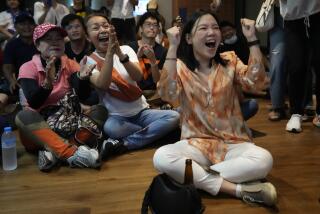Opposition enlivens Kurd election
- Share via
SULAYMANIYA, IRAQ — The cry went up loud and clear from the tens of thousands of people crammed together at the campaign rally. “Change! Change!” the crowd chanted. “With our hearts we vote for change!”
Indeed, change has in many ways already come to Iraq’s normally placid semiautonomous region of Kurdistan, the latest scene of a grass-roots movement demanding new leadership and political reforms.
In regional elections Saturday, the two main political factions, the Kurdistan Democratic Party and the Patriotic Union of Kurdistan face an unprecedented challenge to their 18-year monopoly on power from a slate named simply Change.
Under the leadership of a disgruntled former PUK official, Change has galvanized, among others, young Kurds frustrated with what they see as the corrupt and autocratic behavior of the two ruling parties, which have run Kurdistan under a power-sharing agreement.
The result has been an electrifying campaign that is a new phenomenon in Iraq.
At night, the streets of Sulaymaniya, Kurdistan’s second city, come alive with the honking of horns as cars and motorcycles trailing Change’s blue flag, emblazoned with a candle, hurtle through the streets. In the city center, people gather and light candles on the sidewalks.
Though Change’s leaders deny any conscious similarity to President Obama’s campaign, it is evident in the slate movement’s official campaign slogan: “Yes, We Can Change It.”
“We must have change because the Kurdish people have suffered from corruption for the last 18 years,” said Kamal Abdullah, 34, a private contractor who says he is out of work because he cannot afford to pay the bribes needed to obtain business.
“This government took all the money and sent it outside to Swiss bank accounts, and they give all the jobs to their own children,” he said.
The PUK and KDP, running jointly as the Kurdistani List, have been forced to step up their campaign. The last election, in 2005, was a staid affair; the alliance ran virtually unopposed and won all but seven of the 100 parliamentary seats up for grabs. This time, they’re also holding rallies, organizing parades and calling door-to-door to bring out the vote.
“Now we have to work hard to get support. It’s no longer politics as usual in Kurdistan,” said the PUK’s Barham Salih, deputy prime minister in Iraq’s central government. The party’s leader is Iraqi President Jalal Talabani.
Salih has been asked to head the Kurdistani List, which means that, if the alliance wins, he probably will leave his post in Baghdad to become the next prime minister in the regional administration. The odds remain good that it will.
The ruling parties control the state’s resources, most of the news media and the security forces, said independent newspaper publisher Asos Hardi.
The Change list’s organizational reach doesn’t extend far beyond its base in Sulaymaniya province. Campaigning in the two other provinces, Irbil and Dahuk, has been far more sedate.
Another opposition list, Services and Reform, an unlikely alliance of socialists and Islamists, is believed to be winning some support. Though reliable polls don’t exist, Hardi predicts that challengers will earn one-fifth to more than one-third of the seats in what had been regarded as a rubber-stamp legislature.
“We will have voices of opposition in the Kurdish parliament for the first time,” he said.
The region’s president, KDP leader Massoud Barzani, faces four independent challengers, but he is expected to be reelected.
It is perhaps a measure of the relative tranquillity that has prevailed in this northern enclave since the U.S.-led invasion in 2003 that such a spirited opposition movement has emerged.
As the rest of Iraq disintegrated amid the insurgency and sectarian violence, Kurdistan set about restoring its infrastructure, drilling oil wells and building hotels. The region’s peshmerga militia, jointly controlled by the ruling parties, has largely succeeded in keeping at bay the militants who have wrought havoc elsewhere in Iraq.
But as life has normalized, discontent has grown. The PUK and KDP run Kurdistan as though it were their fiefdom, Change supporters say. The Barzani and Talabani clans control most of the major private companies that have benefited from the post-invasion boom.
“It’s not enough to compare us with Baghdad. We should compare ourselves to the rest of the world,” said Change’s campaign manager, Mohammed Tawfiq. “Yes, we have stability. But we also want services, transparency and better government.”
The ruling alliance has gone on the defensive, acknowledging that corruption and mismanagement need to be addressed and promising to give parliament a greater oversight role.
One issue in dispute is the Kurdish claim to lands in Kirkuk and other areas along the current borders of Kurdistan.
The leaders of the Change list have accused the two main parties of not doing enough to assert Kurdish claims to those territories. The Kurdistani List has countered that it is best situated to assert those claims, given its long experience in dealing with Baghdad. But both sides say that asserting Kurdish claims to the land is a priority.
So while the election may bring a halt to some of the fiery rhetoric that has helped escalate tensions with the Iraqi government over the issue, it is unlikely it will have any effect on Kurdish aspirations, said Qubad Talabani, son of the Iraqi president.
“When it comes to national politics, there isn’t much difference between the parties and slates,” said Talabani, Kurdistan’s representative in Washington, who has returned home for the election.
“While we’re all competing with each other locally, we would join together on issues of national politics.”
--
More to Read
Sign up for Essential California
The most important California stories and recommendations in your inbox every morning.
You may occasionally receive promotional content from the Los Angeles Times.













